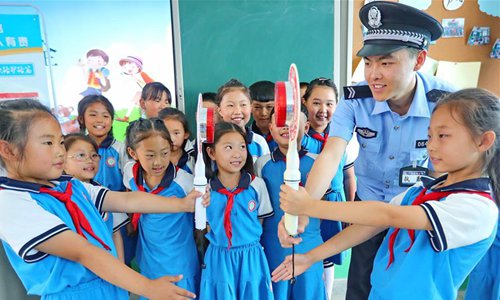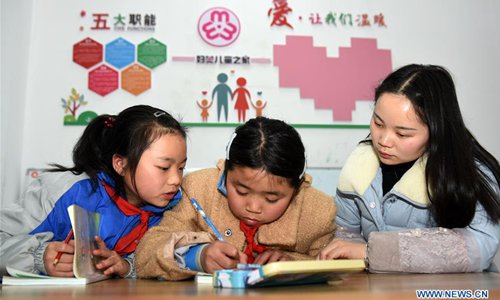HOME >> CHINA
New guideline stresses morals in compulsory education
By Cao Siqi and Zhao Yusha Source:Global Times Published: 2019/7/9 22:42:13
Document to cultivate successors of socialism

Pupils hold stop signs during a safety education event at the No.1 Primary School of Donggang Township in Qinhuangdao, North China's Hebei Province, June 27. Safety education activities are held across China to help raise students' awareness about safety for a safe summer vacation. Photo: Xinhua
Highlighting moral education, a new guideline to improve the quality of compulsory education has been widely hailed as a milestone in China's education reform and an aid to the cultivation of successors in achieving the great rejuvenation of the Chinese nation.
The Communist Party of China (CPC) Central Committee and State Council published the guideline on Monday, aiming to develop an education system that will foster citizens with an all-round moral, intellectual, physical, aesthetic grounding and a hard-working spirit.
It is the first guideline released by the two organs for improving compulsory education since the founding of New China in 1949.
China implemented a law for a free nine-year compulsory education - six years primary, three years secondary - on July 1, 1986. The law establishes the requirements for attaining a universal education and guarantees school-age children the right to receive at least nine years. It is a crime for parents to deprive their children of this right, according to the law.
The guideline requires moral education and all-round development of students to be priorities, and efforts should be made to foster students' quality with firm faith, patriotism, integrity, broad knowledge and striving spirit.
Compulsory education should emphasize the cultivation of students' core socialist values, traditional Chinese culture and mental health. Schools should strengthen education in patriotism, collectivism and socialism, plus guide children and teenagers to listen to the CPC and follow the Party.
Education experts noted it is the first time such a document raises the concept of political enlightenment education, which indicates that compulsory education shoulders the responsibility of enhancing children and teenagers' national and ethnic identity.
"It can help the students form sound socialist core values from an early age. When they grow up, they will become a supporter of the motherland and the new generation who takes on the responsibility of national rejuvenation," Yu Fayou, director of the Beijing-based National Institute of Education Sciences, told the Global Times.
Chinese President Xi Jinping has promised to fulfill the Chinese dream of national rejuvenation and realize the goals set for the centenaries of the CPC in 2021 and the People's Republic of China in 2049.
Speaking at a national education conference on September 10, 2018 which marked China's 34th Teachers' Day, Xi hailed education as the fundamental task of the country and the Party, saying the goal of the educational cause is to cultivate socialist builders and successors with all-around moral, intellectual, physical and aesthetic grounding with a hardworking spirit.
The main force to realize this goal is either receiving or about to receive compulsory education, so the reform will contribute greatly in fostering the successors of the construction of socialism, said Chu Zhaohui, another research fellow at the institute.

A community worker (right) helps students do homework at an after-school care center in Yuping Dong Autonomous county in Southwest China's Guizhou Province, February 27. Since 2018, Yuping has been committed to providing tutoring service by volunteers composed mainly of school teachers, community workers and college students, for primary students who were unattended after school. Photo: Xinhua
Hard slogs
Education insiders also pointed out that the guideline has not only made the future direction for education reform clearer, but more importantly addresses the long-term hard slogs in compulsory education.
For example, the guideline calls for strengthening physical education, enhancing aesthetic training with more art curriculums and activities, and encouraging students to participate in more physical exercise to boost their hard-working spirit.
"Comprehensive development" is not a new phrase, they noted. Although raised years ago, parents and schools tend to care more about test scores and less about PE classes amid the pressures of schoolwork. Many observers noted that the pledge "Labor is the most glorious thing" has turned out more of a slogan than a practical call to action.
Chu noted that schools for compulsory education are now expected "to arrange more courses featuring arts, sports and other subjects beneficial for students' overall qualities in future and invest heavily in cultivating teachers in those fields."
The guideline proposes more specific measures requiring joint efforts from family, school and society to promote students' labor spirit, such as building an experimental base for students to learn farming skills in rural areas and organizing students to participate in community service.
It also stipulates that except for those who are necessarily exempted from physical exercise, students cannot obtain graduation certificates unless they attain certain standards of physical health and fitness. Physical health performance will be included in high school enrollment standards and each student must master one or two sports skills.
Educators have noted that although the central government has many times vowed to reduce the burden of school work on students in compulsory education, the results have been mixed at best.
In the guideline, schools cannot arbitrarily increase or decrease class time, change difficulty or adjust study progress. They are also banned from publicizing scores and ranks, organizing excessive examinations and requesting parents to check schoolwork.
The guideline forbids schools from using examinations, competitions or training certificates as the basis for enrollment, requesting them to include comprehensive quality into the evaluation system, a move which analysts believe will help root out society's obsessions with test scores.
Xiong Bingqi, deputy director of the Shanghai-based 21st Century Education Research Institute, noted that although many measures in the guideline have been mentioned in many other documents issued by education bureaus, "the guideline has systematically concluded previous policies and upgraded education polices to a national level, which will help carry out the policy more effectively."
Chen Xi contributed to the story
Posted in: SOCIETY